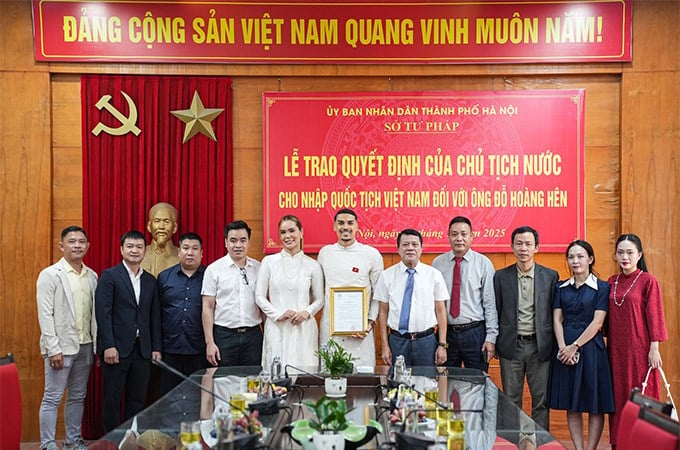
During the ceremony to receive his decision, Do Hoang Hen shared in Vietnamese: “I am very happy, proud, and extremely grateful! I have officially become a Vietnamese citizen… I aspire to contribute to Vietnamese football, and I will strive even harder to live up to everyone's trust and contribute my best to Hanoi Football Club as well as Vietnamese football.”
The brief, clear commitment in Vietnamese not only concludes the legal procedure but also affirms the sporting identity of a player who has been associated with the V-League for nearly five years.
The journey to becoming a "Vietnamese": Language, culture, and professional discipline.
There are two parallel axes that help to clearly visualize Do Hoang Hen's integration journey. Firstly, language and culture. For over two years, Hen has systematically learned Vietnamese, from everyday communication to answering interview questions and discussing tactics in the locker room. He says he memorized the Vietnamese national anthem after only two weeks of self-study and often sings it during competitions.
Language is not only the key to integration, but also a "soft commitment" to respecting both the professional environment and local life. It is this detail that makes Hen's image particularly endearing to the fan community: unpretentious integration, demonstrated through daily habits.
Secondly, there's professional discipline. He maintained a vegetarian diet for about six years, combined with nutritional supplements to ensure his physical condition and recovery ability. This is an uncommon choice among professional players in the V-League, but it clearly reflects how he adjusts his lifestyle to a demanding schedule.
His physical endurance coupled with professional effectiveness is evident in the statistics: In the 2022 season, Hen contributed to Binh Dinh's third-place finish after 16 years; in the 2023-2024 period, he exploded at Nam Dinh with 12 goals and 13 assists, making a significant contribution to their V-League championship. Cumulatively over nearly five years, Hen has 29 goals and 31 assists in domestic competitions, a substantial number to solidify his position.
From Vietnamese language classes to the gym, from street stalls to training grounds, this journey demonstrates a fundamental principle of integration: strong professional skills need to be "wrapped" in social skills, communication abilities, cultural understanding, and discipline. Fortunately, he followed this path in a persuasive way.
At the national team level, international regulations require naturalized players to have resided/played continuously in the country they wish to play for for at least 5 years, counting from the date of registration for professional football. For Do Hoang Hen, the starting point is January 12, 2021 (the date of signing the contract in Vietnam). Therefore, he will only be eligible to play for the national team from January 12, 2026.
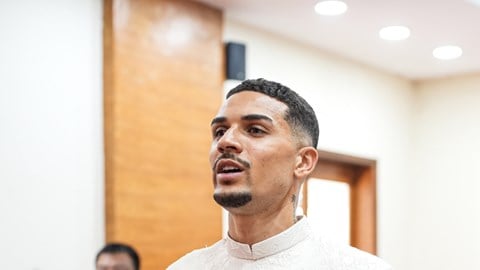
Naturalized player Do Hoang Hen is eager to contribute to Vietnamese football.
The plan for upgrading the "final stage" and operational pace.
From a tactical standpoint, Hen is an attacking midfielder/playmaker who can play deep as a right-sided number 8 or high as a number 10. His goal-scoring statistics highlight two outstanding qualities: firstly, his ability to make a difference in tight spaces at the back of the pitch. Secondly, his passing ability. Further analysis shows that when the opponent actively presses him, Hen tends to draw the wing-back or defensive midfielder out of position with a quick release-turn-break, creating space for the forward to move behind them.
If Xuan Son returns to top form, the Vietnamese national team will have a true "destination-launching" partnership: a number 9 who stays close to the penalty area, holds off defenders, and has diverse finishing abilities; and a playmaker who knows how to place the ball in the right area for Son to take the final touch. Statistics from their time playing together at the club level show that Hen assisted Xuan Son 11 times, which is not a coincidence but stems from their understanding of each other's positions and movement habits.
In the 4-2-3-1 formation currently used by coach Kim Sang-sik, it can switch to a 3-2-5 when in possession. Hen's number 10 role will link the two halves of the space, allowing the full-backs to overlap more effectively because there is a reliable "transfer station" behind them. When a change of tempo is needed, the team can switch to a long ball - early cross, with Hen deciding the landing point and choosing the "gate" (near/far post) for Son or the winger to cut in.
The naturalization of Do Hoang Hen demonstrates a mature process at the human resources policy level: open to welcoming quality talent, yet strict in terms of conditions and evaluation, and clear in terms of utilization criteria. In the period leading up to 2026, and immediately before the next Asian Cup 2027 qualifying match against Malaysia and the ASEAN Cup 2026, the Vietnamese national team needs to both build and utilize – building the next generation and immediately using the pieces that can upgrade the "final stage".
Here, Hen isn't a "magic wand," but rather a guiding light for a diversified human resources strategy: adding a true conductor alongside existing options; adding a voice that has chosen Vietnamese identity through concrete actions; adding a professional standard recognized by the community.
From a technically gifted foreign player to a Vietnamese citizen, Do Hoang Hen has completed his integration journey with very "Vietnamese" steps: learning the language, understanding the culture, maintaining discipline, and proving his worth through effective performances on the field. Ahead lies the "final test" at Hanoi FC, followed by January 12, 2026, for his entry into the national team. If he continues to maintain his form and tactical suitability, Hen will not only be a beautiful story but also a crucial piece in upgrading the organization and finishing of the Vietnamese national team.
Source: https://baovanhoa.vn/the-thao/manh-ghep-chat-luong-cho-doi-tuyen-176237.html



![[Photo] Closing Ceremony of the 10th Session of the 15th National Assembly](/_next/image?url=https%3A%2F%2Fvphoto.vietnam.vn%2Fthumb%2F1200x675%2Fvietnam%2Fresource%2FIMAGE%2F2025%2F12%2F11%2F1765448959967_image-1437-jpg.webp&w=3840&q=75)



![[Photo] Prime Minister Pham Minh Chinh holds a phone call with the CEO of Russia's Rosatom Corporation.](/_next/image?url=https%3A%2F%2Fvphoto.vietnam.vn%2Fthumb%2F1200x675%2Fvietnam%2Fresource%2FIMAGE%2F2025%2F12%2F11%2F1765464552365_dsc-5295-jpg.webp&w=3840&q=75)


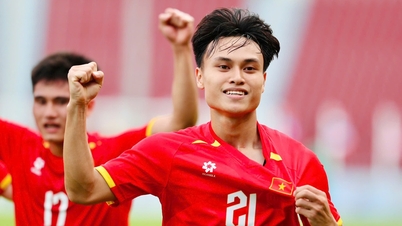

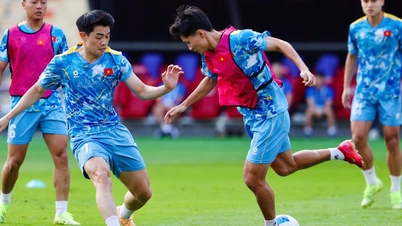
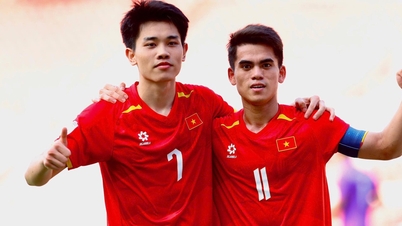
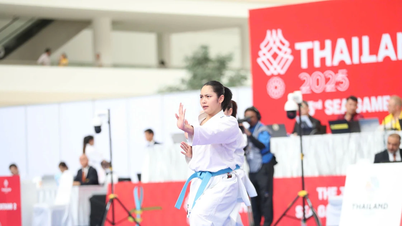

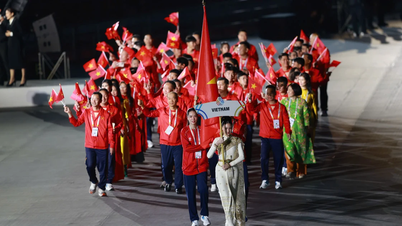





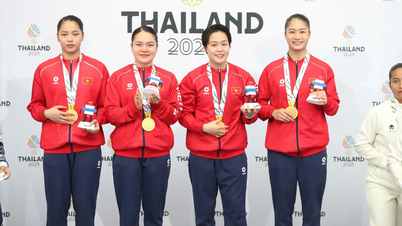

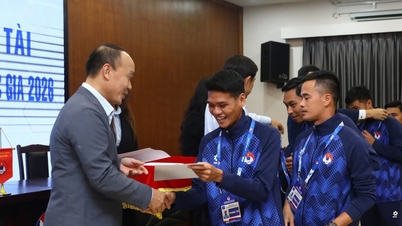
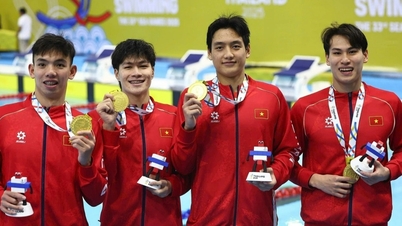





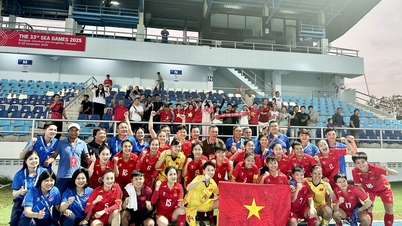
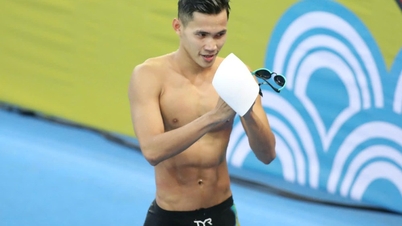


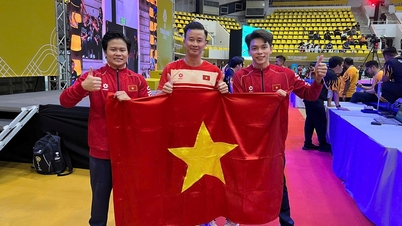


















![[OFFICIAL] MISA GROUP ANNOUNCES ITS PIONEERING BRAND POSITIONING IN BUILDING AGENTIC AI FOR BUSINESSES, HOUSEHOLDS, AND THE GOVERNMENT](https://vphoto.vietnam.vn/thumb/402x226/vietnam/resource/IMAGE/2025/12/11/1765444754256_agentic-ai_postfb-scaled.png)




























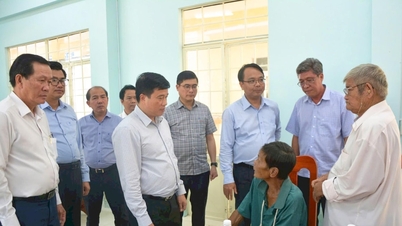





















Comment (0)